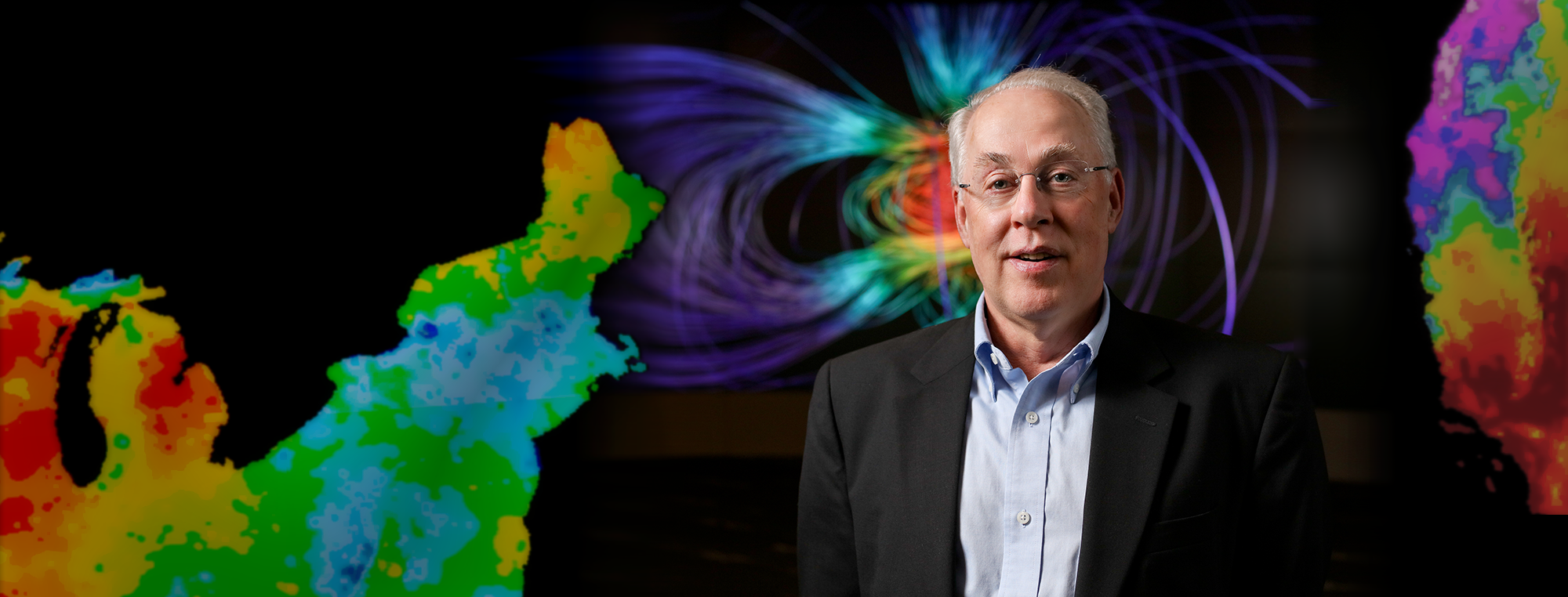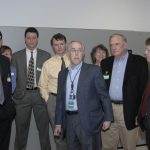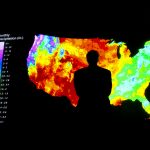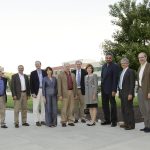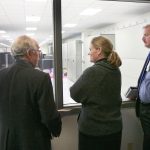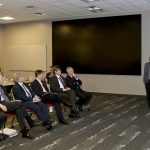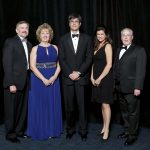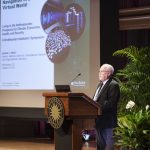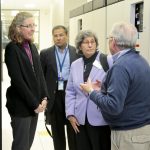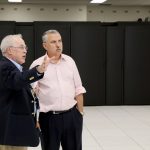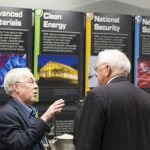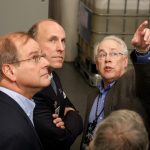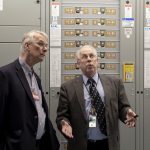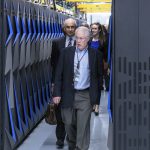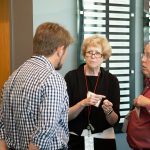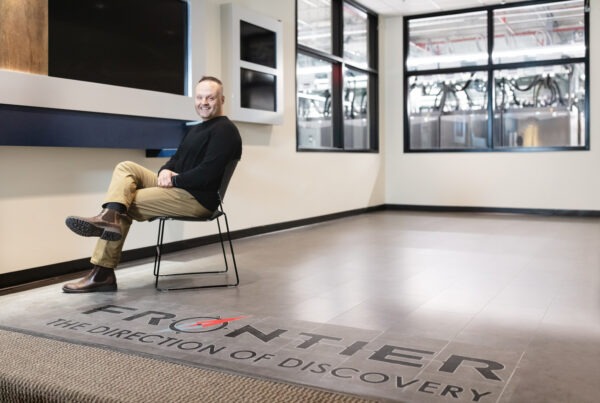Delivering scientific breakthroughs on the world’s most powerful supercomputers requires leaders with the experience and knowledge of how to run the high-performance computing (HPC) centers that house them. That’s precisely why James Hack was hired in 2007—to direct the National Center for Computational Sciences (NCCS) at the US Department of Energy’s (DOE’s) Oak Ridge National Laboratory (ORNL).
At the time, Hack was already well-known for his expertise in computational climate science. He had previously spent 23 years at the National Center for Atmospheric Research (NCAR) working first as a senior scientist, then as a climate modeling section head, and finally as a deputy director at the Climate & Global Dynamics Division at NCAR. During his first few years at NCCS, he established the Oak Ridge Climate Change Science Institute (CCSI) to integrate climate activities across ORNL, setting a vision for the climate science areas across the laboratory with the goal of recruiting and developing strong leaders in the field.
Hack’s background as a computational climate scientist eventually drove his success as director of NCCS, where he set the Oak Ridge Leadership Computing Facility (OLCF) on a path to become a global force in scientific computing.
Last month, Hack retired from his 40-year career in computing and his 13-year career at the OLCF. During those 13 years, Hack saw the delivery of three Top500 computing systems: the Cray XT5 Jaguar, the Cray XK7 Titan, and the IBM AC922 Summit—the OLCF’s current flagship system and the fastest supercomputer in the nation. Despite his retirement, Hack’s leadership and the vision he founded for the OLCF will continue to benefit the center for years to come, including in the upcoming delivery and eventual scientific impact of the OLCF’s first exascale system, Frontier.
“Jim has been truly instrumental in driving the OLCF to where it is today,” said Barbara Helland, associate director of the DOE Office of Science’s Advanced Scientific Computing Research (ASCR) program. “Over the years, he kept the center’s morale up, fostered a strong connection with the Argonne Leadership Computing Facility [ALCF], and consistently delivered breakthrough scientific results aligned with the Office of Science’s mission.”
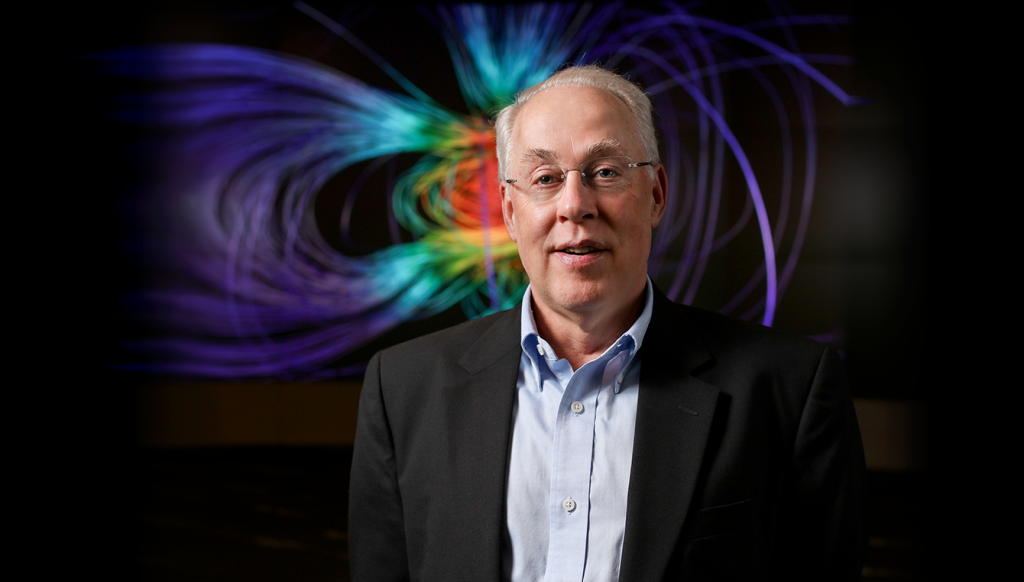
Jim Hack in the Exploratory Visualization Environment for Research in Science and Technology, or EVEREST. Image Credit: Jason Richards, ORNL
A computational science pipeline
When Hack founded the CCSI at ORNL in 2009, he sought to recruit, grow, and enhance scientific contributions and research throughout ORNL and the DOE national laboratory complex for the field of climate. And although he had only been hired at ORNL 2 years prior, it was not the first time he had set out to establish a pipeline for growth and scientific advancement in the national laboratory space.
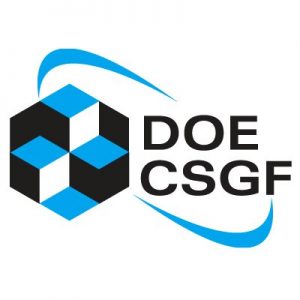 In fact, one of his first initiatives to equip the next generation of computational scientists began even before his tenure at ORNL, in 1991, when he helped found the DOE Computational Science Graduate Fellowship (CSGF). The CSGF has unique opportunities for PhD students using math and computers for their doctoral research. The program provides students with benefits such as a yearly stipend, paid tuition, and a 12-week practicum at one of the 21 DOE national laboratories or sites.
In fact, one of his first initiatives to equip the next generation of computational scientists began even before his tenure at ORNL, in 1991, when he helped found the DOE Computational Science Graduate Fellowship (CSGF). The CSGF has unique opportunities for PhD students using math and computers for their doctoral research. The program provides students with benefits such as a yearly stipend, paid tuition, and a 12-week practicum at one of the 21 DOE national laboratories or sites.
“Jim was one of the originators of the fellowship and has been a member of the CSGF steering committee since the program started,” said Judy Hill, a CSGF alumna and today the Section Head of Science Engagement at NCCS. In the past, Hill has credited the networking opportunities at CSGF for her original appointment at ORNL.
“I wouldn’t be where I am today if I wasn’t in that program,” Hill said. “It has had—and continues to have—an impact on my life and on my career.”
Helland, also one of the founders of CSGF, said Hack advised the CSGF fellows on appropriate courses to take and continually recognized the need for new technology focus areas such as machine learning and data science. In 2018, Hack helped lead the effort to establish a new CSGF track in math and computer science for doctoral candidates in applied math, statistics, or computer science.
“Not only did Jim consistently work to expand CSGF, but also he helped maintain its strong focus on HPC,” Helland said. “He played an integral part in training the current generation of computational scientists.”
Setting science in motion with INCITE
One of Hack’s biggest contributions to the OLCF was in his stewardship of DOE’s Innovative and Novel Computational Impact on Theory and Experiment, or INCITE, program. The INCITE program awards time on the supercomputers at the OLCF and ALCF to researchers using HPC to solve “grand challenge” problems in science and engineering. The OLCF and ALCF are DOE Office of Science User Facilities located at ORNL and Argonne National Laboratory, respectively.
Throughout his time at the OLCF, Hack helped attract researchers to INCITE and improve the quality of both proposal reviewers and researchers in the program. He also kept the OLCF’s connection to ALCF and managed the centers’ joint INCITE call for proposals, viewing the success of the program as an ethical responsibility to the community.
“The LCFs are taxpayer resources, and Jim always fought to keep the focus of INCITE on the broader mission of the LCFs,” Hill said. In 2015, Hack asked Hill to step into the role of INCITE program manager for INCITE.
As NCCS director, Hack led the INCITE allocation process each year, during which 11 National Academy–level panels determine which projects will receive allocations of computing time through INCITE.
“Jim successfully led this effort year after year and consistently delivered high-quality science as a result of that,” said Jeff Nichols, Associate Lab Director of the Computing and Computational Sciences Directorate (CCSD) at ORNL. “His legacy to the OLCF is delivering scalable, impactful science results for 13 years.”
Gina Tourassi was appointed director of NCCS at the end of 2019 as Hack transitioned to a strategic leadership role in CCSD for the remainder of his time at ORNL.
A vision for computing and beyond
Hack’s leadership of NCCS and contributions to the HPC community at ORNL ultimately transformed the center into the multiprogrammatic entity that it is today.
“When Jim came to ORNL in 2007, we were the OLCF. When he left, we were the OLCF, the US Air Force, the Compute and Data Environment for Science [CADES], and more,” said Ashley Barker, Section Head of Operations at NCCS. One of Hack’s first hires, Barker worked under him as the Group Leader of the OLCF’s previous User Assistance and Outreach Group for 11 years.
“Jim’s deep expertise in using HPC and the vision he had for the center are why we are here. He helped build the reputation that the OLCF was the place to come build and run supercomputers,” Barker said.
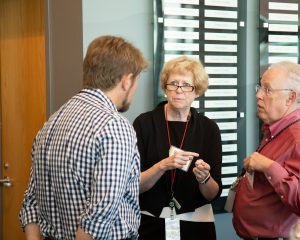
Travis Humble, Barb Helland, and Jim Hack at the Artificial Intelligence – AI for Science Town Hall hosted by ORNL on August 20, 2019. Image Credit: Megan Jamerson, ORNL
Aside from his professional accomplishments, Hack was a people person with vision for all-around success at the center.
“He cared about us—and not just as people who are delivering systems or supporting users,” Barker said. “If you engaged with him, he knew your children and your husband. He knew you as a person, and that really contributed to the health of the center overall.”
“Jim is one of those people that has enriched my life greatly,” Helland said. “He’s taught me many things, and he has forever changed the trajectory of computing in the DOE complex with the contributions he has made to students, staff, and the user community. I am grateful to have worked with him all these years.”
- Tour of the second floor computer room. Climate Change discussion and tour, February 1, 2008. Image Credit: Curtis Boles, ORNL
- Jim Hack at the EVEREST powerwall, building 5600, June 3, 2008. Image Credit: Jason Richards, ORNL
- Group photo for a National Oceanic and Atmospheric Administration, or NOAA, procurement activity, May 4, 2010. Image Credit: Curtis Boles, ORNL
- Group photo of Science Advisory Board (SAB) and CCSI Leadership. SAB meeting, September 29, 2010. Image Credit: Jason Richards, ORNL
- Dignitaries from NOAA visit the ORNL computer room, December 16, 2010. Image Credit: Jason Richards, ORNL
- Anderson County Mayor Terry Frank visits ORNL, January 11, 2013. Jim Hack provides tour from the computer room observation area. Image Credit: J. W. Nave, ORNL
- Former Secretary of Energy Ernest Moniz receives a demonstration at the EVEREST visualization Lab, Consortium for Advanced Simulation of Light Water Reactors (CASL), June 3, 2013. Image Credit: Jason Richards, ORNL
- Awards Night winners with Thom Mason after the program, Knoxville Convention Center, November 15, 2013. Image Credit: Jason Richards, ORNL
- Navigation in a Virtual World Smithsonian Talk “Living in the Anthropocene: Prospects for Climate, Economics, Health, and Security” given by Jim Hack on October 9, 2014 in Washington D.C.
- Judy Hill, Amit Goyal, Dr. Susan Solomon, and Jim Hack in the NCCS computer room. Dr. Solomon gave a Eugene P. Wigner Distinguished Lecture at ORNL on December 10, 2014. Image Credit: Jason Richards, ORNL
- Jim Hack in EVEREST, May 3, 2017. Image Credit: Jason Richards, ORNL
- Eugene P. Wigner Distinguished Lecture Series in Science, Technology, and Policy – Thomas L. Friedman, May 10, 2017. Jim Hack provides a tour of the OLCF. Image Credit: Jason Richards, ORNL
- Congressmen Mac Thornberry 13th District of Texas and Chuck Fleischmann 3rd congressional district of Tennessee, October 6, 2017. Image Credit: Jason Richards, ORNL
- OLCF 25th anniversary celebration, November 7, 2017. The OLCF celebrates 25 years of leadership in high-performance computing. Distinguished visitors who helped shape the OLCF were invited to speak. Image Credit: Carlos Jones, ORNL
- Jim Hack gives a supercomputing tour during a visit from Paul Dabbar, Under Secretary for Science at DOE, and Kristen Ellis, Chief of Staff to the Under Secretary for Science, on December 19, 2017. Image Credit: Jason Richards, ORNL
- Buddy Bland and Jim Hack with the OLCF’s Summit supercomputer, April 11, 2018. Credit: Jason Richards, ORNL
- Nobel Laureate Sir Richard Roberts receives an overview of the OLCF by Jim Hack, February 6, 2019, after Roberts gives a Distinguished Eugene P. Wigner Lecture at ORNL. Image Credit: Carlos Jones, ORNL
- Chris Liddell and Kelvin Droegemeier, White House visitors, receive a tour in the Summit computer room, June 5, 2019. Image Credit: Carlos Jones, ORNL
- Travis Humble, Barb Helland, and Jim Hack at the Artificial Intelligence – AI for Science Town Hall hosted by ORNL, August 20, 2019. Image Credit: Megan Jamerson, ORNL
- US Senators Lamar Alexander and Angus King, along with University of Maine staff—Dannel Malloy, Chancelor; Joan Ferrini-Mundy, President; and Habib Dagher, Executive Director—receive a tour hosted by Jim Hack at the OLCF Summit supercomputer, December 6, 2019. Image Credit: Carlos Jones, ORNL
- Gina Tourassi and Jim Hack, the incoming and outgoing NCCS Division Directors, December 16, 2019. Image Credit: Carlos Jones, ORNL
UT-Battelle LLC manages Oak Ridge National Laboratory for DOE’s Office of Science, the single largest supporter of basic research in the physical sciences in the United States. DOE’s Office of Science is working to address some of the most pressing challenges of our time. For more information, visit https://energy.gov/science.


